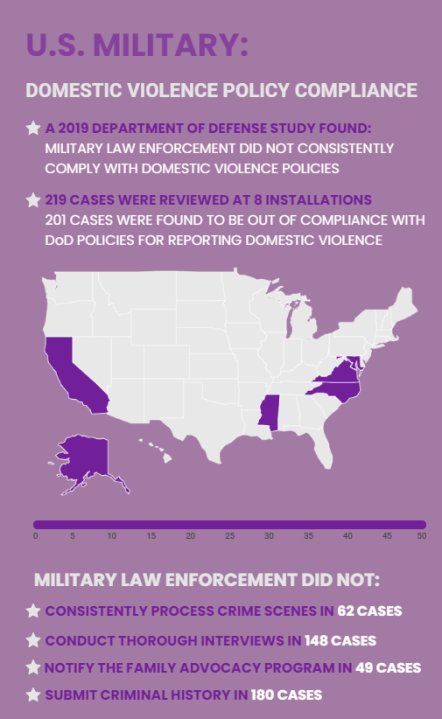October is Domestic Violence Awareness Month. 10 On Your Side is committed to “Break the Cycle” of domestic violence. Every Wednesday in October 2020 we will tell the stories of domestic violence survivors and victims.
NORFOLK, Va. (WAVY) — Dani Sanchez thought she’d met her prince charming when she began dating a U.S. Navy sailor who was stationed in Norfolk.
“He swept me off my feet,” she said. “He said all of the right things. He did all of the right things. He just got me to open up in a way I hadn’t before.”
What began as a whirlwind romance in January 2016 quickly turned toxic after the couple found out they were expecting a baby girl in the spring.
“Everything changed. We were constantly fighting,” she said. “Constant anger and animosity between us. Calling me names, saying horrible things to me.”
The tumultuous relationship was on the rocks throughout Sanchez’s pregnancy. Sanchez hoped the couple would be able to co-parent after their daughter was born, but her then-boyfriend wanted more.
“He wanted to be a family, and he was willing to do anything and everything he could possibly do,” she said.
Still on shaky ground, the couple decided to get married when the sailor received orders to a Navy base in Mississippi in January 2017. The verbal abuse that permeated the relationship turned into physical violence a week before they moved.
“I was apologizing to him because he got upset and hurt me, and then I moved with him cross country, away from my family and friends, where I had no one,” Sanchez said.
The relationship continued to deteriorate when the couple got to Mississippi. Sanchez said her then-husband controlled her movements and their money and isolated her from her friends.
“I wasn’t allowed to leave the house without permission,” she said.
Soon after the move, the couple found out they were pregnant with their second daughter, but there was very little joy. The romance in their relationship was gone, replaced by a cycle of anger, abuse, and broken promises. That’s when Sanchez decided she needed to escape.
“Leave. Don’t stay,” she said. “When you are in a relationship like that, there is no fixing it. There is no making it better.”

Sanchez reported the abuse to military police, and the Navy investigated it. Sanchez provided 10 On Your Side with a copy of the Navy’s investigative findings. Their investigation confirmed three instances in which the Navy could substantiate that Sanchez was physically, emotionally, and sexually abused by her ex-husband. Their investigation did not substantiate a fourth instance when Sanchez said she was physically abused.
“It was overwhelming. The poking and prodding into every little aspect of my marriage. It felt like they were trying to twist everything on me,” Sanchez said of the investigation. “I get that you have to be cautious in those situations. You have to make sure that the victim isn’t crying wolf. That they aren’t the actual abuser. But they constantly made me feel ashamed of myself. They made me feel like it was my fault.”
10 On Your Side has not reported Sanchez’s ex-husband’s name because he was not criminally charged with or convicted of domestic abuse. The Navy’s investigation wasn’t criminal, and their findings only appear in the military’s system. Sanchez said her ex-husband wasn’t removed from military service despite the Navy’s investigation and findings that he abused her.
“If you run a background check on my ex-husband today, you will not see any of those charges,” Sanchez said.
U.S. Rep. Gerry Connnolly (D-Va.) is the chairman of the House Subcommittee on Government Operations. He said that domestic violence in the military is an underreported issue, made more complicated by the unique military lifestyle, including financial support, constant moving, and the fear of ruining a loved one’s career.
“We already know that there is a sort of culture on suppressing this and not acknowledging it. Whatever the data shows, I assure you it’s higher than that,” Connolly said.
Some of the data that is available shows that military police aren’t always consistent when dealing with domestic violence.
A 2019 Department of Defense study examined 219 cases of domestic violence at eight military installations in Virginia, North Carolina, Maryland, Mississippi, California, and Alaska. In 2019 of those cases, military police didn’t fully comply with at least one of the following domestic violence policies: Consistently processing crime scenes, conducting thorough interviews, notifying the family advocacy program, and submitting criminal history.
“Especially within the military, it gets covered up,” Connolly said. “It gets sort of sublimated by other things. There is sometimes a culture of protection not for the victim, but for the perpetrator.”
Other organizations are also working to collect data on the prevalence of domestic violence in military relationships.
Blue Star Families, a nonprofit organization founded by military spouses, has asked questions about domestic violence and safety in several of their annual Military Family Lifestyle Surveys. Although each survey represents a small portion of military families from across the branches — the organization is hoping to get 10,000 responses for their 2020 report — the findings show that domestic violence, verbal abuse, and the feeling of being unsafe in a relationship impacts both service members and their spouses.
Blue Star Families asked questions about intimate partner violence most recently in 2019. At that time, 1.6% of spouses and 1.7% of service members who responded to the survey said they’d experienced some form of intimate partner violence, including physical and sexual assaults, stalking, and psychological aggression, said Blue Star Families Researcher Jessica Strong.
“It’s a small percentage, but each case is, of course, very important,” Strong said.
Two years prior, a Blue Star Families survey found that 15% of respondents reported that they did not feel physically safe in their relationships.
“We tend to picture intimate partner violence as physical violence, bruising or hurting someone, but it takes many other forms as well, such as social isolation and financial control and verbal abuse,” Strong said.
When abuse is reported, the military and civilian justice systems don’t always work together. Currently, military commanders can issue protective orders, but they aren’t always recognized by civilian law enforcement. Survivors who want full coverage must obtain protective orders in both the military and civilian worlds.
Connolly is working with California Rep. Jackie Speier to reform military protective orders through legislation introduced to Congress in July. The bill would allow the military to issue protective orders that would be recognized by civilian courts and law enforcement.
“For the first time, it would require civilian courts to respect military protective orders and vice versa,” Connolly said.
The legislation would also require that information about domestic abuse would appear in service member’s background checks.
“What we are finding is some resistance within the military to do that because they’re afraid of the black mark it will create on someone’s career and record,” Connolly said. “But it seems to me that the primary concern is protecting victims from domestic violence. If you don’t want a black mark on your record, then don’t engage in domestic violence.”
Sonia Smith works as the Navy’s Family Advocacy Program policy manager. The Family Advocacy Program is focused on preventing violence, and she said a large focus of her work is helping sailors and their families identify toxic relationships early and seek help.
“We really, really encourage our sailors to seek help early rather than later so we can approach these problems and issues early,” Smith said.
Smith said the Family Advocacy Program is part of a “coordinated community response,” which includes medical, victim advocacy, and counseling services, as well as contact with law enforcement and victim assistance.
Smith said that Navy bases in Hampton Roads have not seen an uptick in domestic violence cases. In the last several years, between 520 and 530 domestic violence cases that have met the Navy’s standard for abuse have been reported to commands in Hampton Roads.
“We know that domestic violence is a really serious thing, and that’s why the safety of our victims is a top priority,” Smith said. “It’s our number one priority.”
Sanchez hopes sharing her story leads to changes within the military’s domestic violence reporting system and investigation process.
“You can’t love someone enough to make them treat you the way that you deserve,” Sanchez said. “You just have to leave and you have to let it go.”
If you or someone you know is a survivor of domestic violence, you can reach out to the Virginia Sexual and Domestic Violence Action Alliance hotline. Call 800-838-8238, text 804-793-9999, or send a chat.
10 On Your Side has also put together a list of local and national resources for domestic violence survivors and their families.










































































































